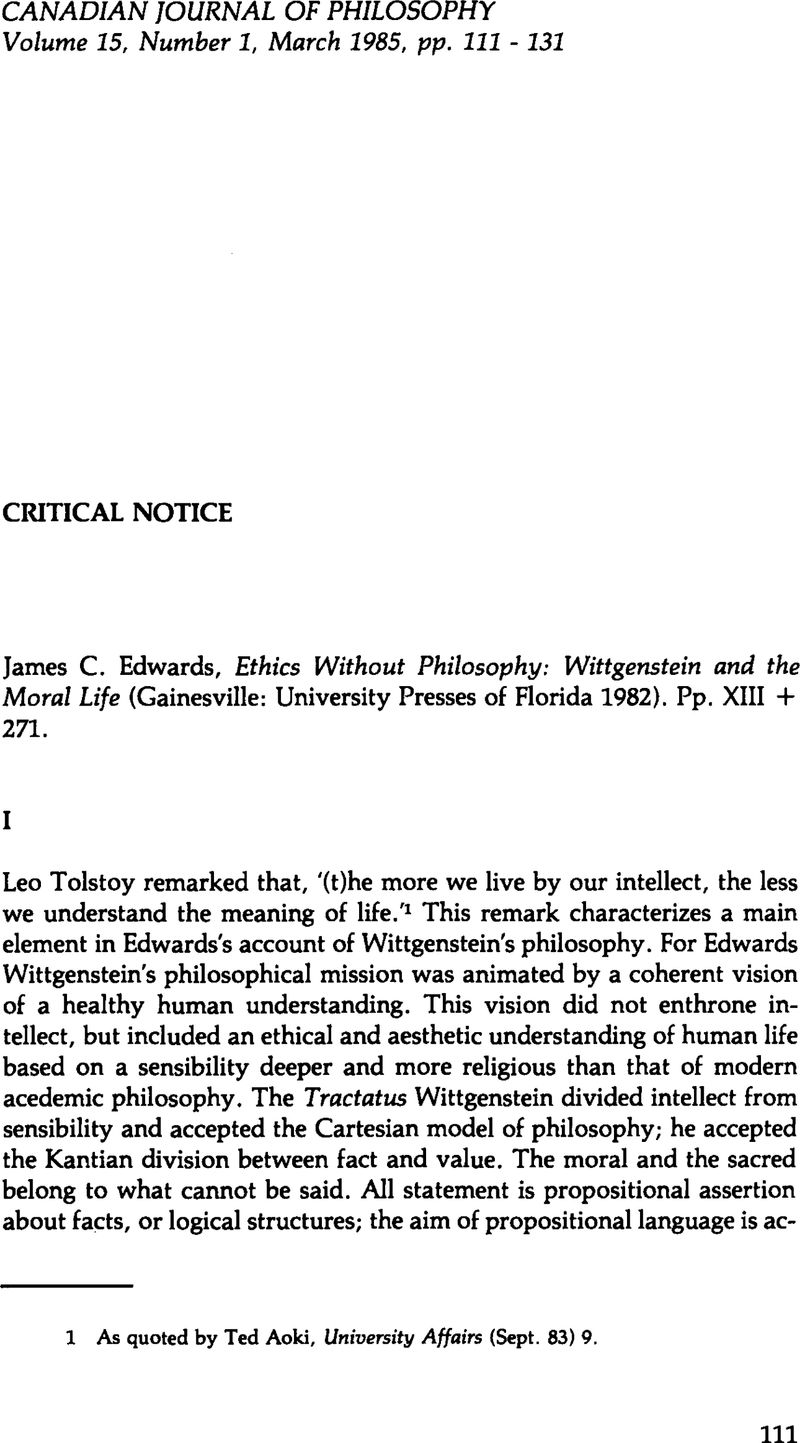No CrossRef data available.
Article contents
James C. Edwards Ethics Without Philosophy: Wittgenstein and the Moral Life (Gainesville: University Presses of Florida 1982). Pp. XIII + 271.
Published online by Cambridge University Press: 01 January 2020
Abstract

- Type
- Critical Notice
- Information
- Copyright
- Copyright © The Authors 1985
References
1 As quoted by Aoki, Ted University Affairs (Sept. 83) 9.Google Scholar
2 Edwards acknowledges his debt to Richard Rorty. See Rorty's, Philosophy and the Mirror of Nature (Princeton: Princeton University Press 1979).Google Scholar Rorty sees Wittgenstein's later work as anti-foundational.
3 Wittgenstein's life leaves no doubt that he had a sense of mission in philosophy, and this was connected with his background. For accounts of Wittgenstein's background in relationship to his philosophy see: Janik, A. and Toulmin, S. Wittgenstein's Vienna (New York: Simon and Schuster 1973);Google Scholar and Engelmann, Paul Letters from Ludwig Wittgenstein (With a Memoir) (Oxford: Blackwell 1967).Google Scholar Also note that O.K. Bouwsma wrote in 1968 that Wittgenstein was trying to bring us to a new sensibility toward language. See,Bouwsma, O. K. Toward a New Sensibility (Lincoln: University of Nebraska Press 1982), p. 1Google Scholar
4 Edwards's interpretation would also seem to place Wittgenstein in the company of (what we might call) visionary philosophers. This brings me to the central question that Edwards's book raises: Is there such a discipline as enlightening or transformative philosophy? If so, have there been other philosophers who practiced it? Certainly some think so. [See, e.g., Taber, J.A. Transformative Philosophy (Honolulu: University of Hawaii Press 1983)Google Scholar, and also Streng, Frederick Emptiness: A Study in Religious Meaning (Nashville: Abingdon 1967).Google Scholar Many more examples could be cited.] Transformative philosophy alters our basic patterns of experiencing and increases our clarity. Other philosophers who could be mentioned as transformative are Heraclitus, Socrates, Plato, Lao Tzu, Sankara, Nagarjuna, Spinoza, Fichte and Heidegger
5 Nielsen, Kai ‘On Needing a Moral Theory: Rationality, Considered Judgements and the Grounding of Morality,’ Metaphilosophy 13 (1982) 97–116.CrossRefGoogle Scholar Nielsen argues that this failure is related to our lack of a critical social theory.
6 Edwards made this clear to me in a letter. In defense of my reading of Wittgenstein on this matter consider: there is no formula proof for the impossibility of foundational ethical theory, a kind of Goedel's theorum. Rather, it is part of Wittgenstein's vision and if you find in his work a sufficient number of examples (perspectives?), you come to see that it is not possible. If you do not see this, you keep ‘constructing’ theories, unless you think such theories are horrible. There is no one consideration that might bring this realization to everyone.
7 Malcolm, Norman Ludwig Wittgenstein: A Memoir (London: Oxford University Press 1962).Google Scholar This is also brought out in Wittgenstein's Vienna, and in Engleman, Letters From Ludwig Wittgenstein.
8 If the vision must be transmitted indirectly, how does this differ from subtle persuasion or propaganda? It is true that it is not just a change in beliefs but a shift in sensibilities. But some propaganda aims to do this. This differs from Wittgenstein's later approach in that for him philosophy was an inquiry for attaining clarity of understanding, not conversion to doctrine.
9 William James certainly did not eschew the mystical.
10 For a comparison of Wittgenstein's philosophy and Buddhism see Gudmunsen, Chris Wittgenstein and Buddhism (New York: Barnes and Noble 1977).CrossRefGoogle Scholar
11 Wittgenstein's indirect approach will always be open to other readings. Wittgenstein's writings have some of the same mystery and depth that he saw in the world. Perhaps this was by design necessary to philosophize in a new way. He used a large variety of liberally borrowed ideas: Culture and Value (Oxford: Blackwell1980) 19e. He says that he never invented a line of thought, but used others’ lines of thought for his work of clarification, for which he invented new similies.
12 As quoted in Malcolm, Ludwig Wittgenstein: A Memoir, 100.Google Scholar
13 Wittgenstein's later approach might be likened to the Oriental conception of a Way. A Way is evaluated by the quality of life it makes possible, and by the qualities of its practitioners, as they live it.
14 Wittgenstein, Ludwig Vermischte Bemerkungen (Frankfurt: 1977) 14.Google Scholar As quoted by Rorty in Philosophy and the Mirror of Nature.
15 Thanks to Gary Watson, William Davie, Robert Herbert, John Cook and Kai Nielsen with whom I have had helpful discussion.


